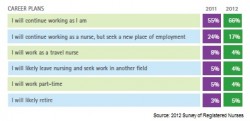 Whether caused by improvements in the economy or improvements in their work-life isn’t clear, but nurses in 2012 are more willing than just a year ago to stay in the profession and continue working right where they are.
Whether caused by improvements in the economy or improvements in their work-life isn’t clear, but nurses in 2012 are more willing than just a year ago to stay in the profession and continue working right where they are.
The 2012 Survey of Registered Nurses found 91 percent of responding nurses satisfied with nursing as a career and almost three-quarters of them (73 percent) said they were satisfied with their current job. That job and career satisfaction — the highest in the three years of the survey — may explain why 66 percent of the nurses intend to “continue working as I am.”
As the survey report itself says, “The 2012 survey results show a much improved sense of satisfaction with both career and job.”
Last year, only 74 percent of the nurses in the survey said they were satisfied with their choice of profession and only 55 percent of the nurses said they intended to “continue working as I am”; 24 percent planned to look for another job. In the 2012 survey, the percentage of nurses intending to change employers dropped to 17 percent.
“These large increases in career and job satisfaction,” notes the survey, “could be indicative of the attention nursing is receiving since the publishing of the IOM report: The Future of Nursing. With a larger degree of focus on nursing and its future, nurses in general feel better about their profession.”
That report on nursing’s future by the Institute of Medicine offered a number of recommendations and goals, one of which is that 80 percent of nurses have a Bachelor of Science in Nursing. However, the 2012 survey found only 17 percent intending to pursue their BSN. Another 23 percent are considering an advanced nursing degree.
The percentages look a little better when the 2,931 respondents to the emailed survey are broken down by age. Few older nurses (those 55 and older) plan to pursue any nursing degree, while among those under 40, 25 percent intend to obtain their BSN, and an additional 43 percent will seek a Master’s or doctoral degree in nursing.
Even as the 2012 survey results show nurses have brightened in their job and career satisfaction, a third of them admitted they “often feel like resigning from my position. About the same percentage said that if they had their way they would “not be working in this job in a year.”
Coupled with the 17 percent who say they’ll be looking for another job in the year, and another 17 percent who say they’ll retire, leave nursing, or otherwise cut back on their hours, the survey suggests that individual facilities — if not the profession as a whole — may still face a nurse shortage.
Notes the survey report:
Based on these results, healthcare facilities should continue to closely examine their nurse retention practices, evaluating compensation structures, work schedules, and other factors that may contribute to positive nurse retention rates. Even though this percentage has declined this past year, healthcare facilities must remember the age of their nursing workforce by unit so that adequate planning for retirement-related attrition can be managed.